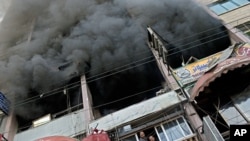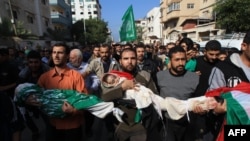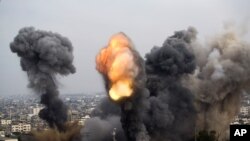JERUSALEM —
As diplomacy intensifies to stop the cross-border attacks between Israel and the Gaza Strip, Palestinian medical workers say more than 19 people were killed by Israeli air strikes Monday, bringing the death toll to at least 96 Palestinians and three Israelis.
The attacks continued as diplomatic efforts in Cairo are reportedly making headway at halting the aerial volleys between Israel and Gaza, now in their sixth day.
Israel's military said Monday it bombed dozens of sites in Gaza, including several buildings housing police of the Hamas movement which controls the territory.
The militant group Islamic Jihad said a strike on a Gaza media tower that houses many foreign journalists killed one of the top commanders in its armed wing, the Al Quds Brigades. It was the second time the building has been hit in as many days.
Watch related video of Israeli offensive in Gaza:
Israel said it also targeted underground rocket launching sites and tunnels used to smuggle and hide weapons.
Freelance journalist Mohamed Dawwas told VOA that while fear is palpable in Gaza, the attitude of residents has hardened after days of airstrikes.
"I see them strong. They really want to continue," he said. "I mean if the Israelis continue bombarding Gaza, they want the resistance to continue resisting the occupation. They really think they are stronger than before, [that] they can face it this time."
Meanwhile, Palestinian militants in Gaza fired dozens of rockets into Israel. No casualties were reported as Israel said its Iron Dome missile defense system intercepted rockets headed towards populated areas.
Gaza funeral
Thousands of chanting Gazans marched in a funeral procession for 13 people, including 11 from one family, who were killed in an Israeli air strike Sunday.
Hamas spokesman Sami Abu Zuhri accused Israel of targeting civilians. He said Israeli military operations are failing, leaving Israeli forces to aim at women and children.
Israel accuses Palestinian militants of using civilians areas in Gaza to hide weapons and rocket launching sites. It says Hamas is targeting residential areas in Israel.
Israeli Prime Minister Benjamin Netanyahu said the army is prepared to significantly expand the offensive if necessary but that Israel prefers a diplomatic solution.
Israel has deployed hundreds of tanks and thousands of troops near Gaza in preparation for a possible ground offensive.
Israeli President Shimon Peres told special Middle East envoy Tony Blair that Israel's only aim is to stop the rockets.
"I think this time Israel is clear that we don't have any ambitions to conquer land or to gain any advantages but, really, to stop the fire," he said.
Blair called for a cease-fire.
"I very much hope that over the coming days we can achieve cessation on a basis that is sustainable, on a basis that stops the threat of missiles coming from Gaza targeted at Israeli civilians, and also then relieves the people of Gaza who have also suffered of course," he said.
International mediation
Blair was one of several international mediators converging on the region hoping to broker an end to the violence which drastically escalated last Wednesday after an Israeli air attack that killed the head of the Hamas military wing.
In Cairo, Egyptian-mediated talks to reach a truce between Palestinians and Israelis are ongoing. United Nations chief Ban Ki-moon arrived in Cairo Monday to support the efforts. While Israel and Hamas were far apart in their demands, both sides said they were open to a diplomatic solution - and prepared for further escalation if that failed.
Israel is demanding that Hamas stop its rocket fire first.
But Khaled Meshaal, the exiled leader of Hamas, said on Monday that Israel must take the first step.
"Whoever started the war must end it," Meshaal said at a news conference in Cairo.
The attacks continued as diplomatic efforts in Cairo are reportedly making headway at halting the aerial volleys between Israel and Gaza, now in their sixth day.
Israel's military said Monday it bombed dozens of sites in Gaza, including several buildings housing police of the Hamas movement which controls the territory.
The militant group Islamic Jihad said a strike on a Gaza media tower that houses many foreign journalists killed one of the top commanders in its armed wing, the Al Quds Brigades. It was the second time the building has been hit in as many days.
Watch related video of Israeli offensive in Gaza:
Israel said it also targeted underground rocket launching sites and tunnels used to smuggle and hide weapons.
Freelance journalist Mohamed Dawwas told VOA that while fear is palpable in Gaza, the attitude of residents has hardened after days of airstrikes.
"I see them strong. They really want to continue," he said. "I mean if the Israelis continue bombarding Gaza, they want the resistance to continue resisting the occupation. They really think they are stronger than before, [that] they can face it this time."
Meanwhile, Palestinian militants in Gaza fired dozens of rockets into Israel. No casualties were reported as Israel said its Iron Dome missile defense system intercepted rockets headed towards populated areas.
Gaza funeral
Thousands of chanting Gazans marched in a funeral procession for 13 people, including 11 from one family, who were killed in an Israeli air strike Sunday.
Hamas spokesman Sami Abu Zuhri accused Israel of targeting civilians. He said Israeli military operations are failing, leaving Israeli forces to aim at women and children.
Israel accuses Palestinian militants of using civilians areas in Gaza to hide weapons and rocket launching sites. It says Hamas is targeting residential areas in Israel.
Israeli Prime Minister Benjamin Netanyahu said the army is prepared to significantly expand the offensive if necessary but that Israel prefers a diplomatic solution.
Israel has deployed hundreds of tanks and thousands of troops near Gaza in preparation for a possible ground offensive.
Israeli President Shimon Peres told special Middle East envoy Tony Blair that Israel's only aim is to stop the rockets.
"I think this time Israel is clear that we don't have any ambitions to conquer land or to gain any advantages but, really, to stop the fire," he said.
Blair called for a cease-fire.
"I very much hope that over the coming days we can achieve cessation on a basis that is sustainable, on a basis that stops the threat of missiles coming from Gaza targeted at Israeli civilians, and also then relieves the people of Gaza who have also suffered of course," he said.
International mediation
Blair was one of several international mediators converging on the region hoping to broker an end to the violence which drastically escalated last Wednesday after an Israeli air attack that killed the head of the Hamas military wing.
In Cairo, Egyptian-mediated talks to reach a truce between Palestinians and Israelis are ongoing. United Nations chief Ban Ki-moon arrived in Cairo Monday to support the efforts. While Israel and Hamas were far apart in their demands, both sides said they were open to a diplomatic solution - and prepared for further escalation if that failed.
Israel is demanding that Hamas stop its rocket fire first.
But Khaled Meshaal, the exiled leader of Hamas, said on Monday that Israel must take the first step.
"Whoever started the war must end it," Meshaal said at a news conference in Cairo.






